
- Level:
- Advanced
- Lessons:
- 10 Lessons
Voice sheets for characters
Record how your character speaks with a dedicated Codex detail, and improve how AI portrays them.
- Reading Time
- approx. 4 min
As the old adage goes, ‘show don’t tell’. Many AI models will stereotype characters if given brief summaries, or won’t write the character in the way you envision in your head.
By giving the AI examples of how your character speaks, what they do while talking, you will find your dialogue is much closer to how you envisioned it.
When should I use voice sheets?
Voice sheets are a great way to get to know your characters, but are especially helpful if:
- Your characters all sound the same
- Your characters all speak the same way to other characters
- A character sounds completely different to how they do in your head
- AI is using stereotypes when portraying your characters
How to make a voice sheet
Before we do anything in Novelcrafter itself, it is worth taking a moment to step back, and think about our characters. What makes them tick? How do they speak? Do they speak differently to different characters - think of the stereotypical underling who sucks up to the boss, but treats the protagonist horribly!
Take some time to mull over your characters, and then list out some example dialogue. It doesn’t have to be what they say in the story itself. We’re wanting to get an essence of the character, not bits of dialogue for the AI to insert verbatim into your prose.
Once you have your voice sheets, you can go into Novelcrafter.
Open up your character’s Codex entry.
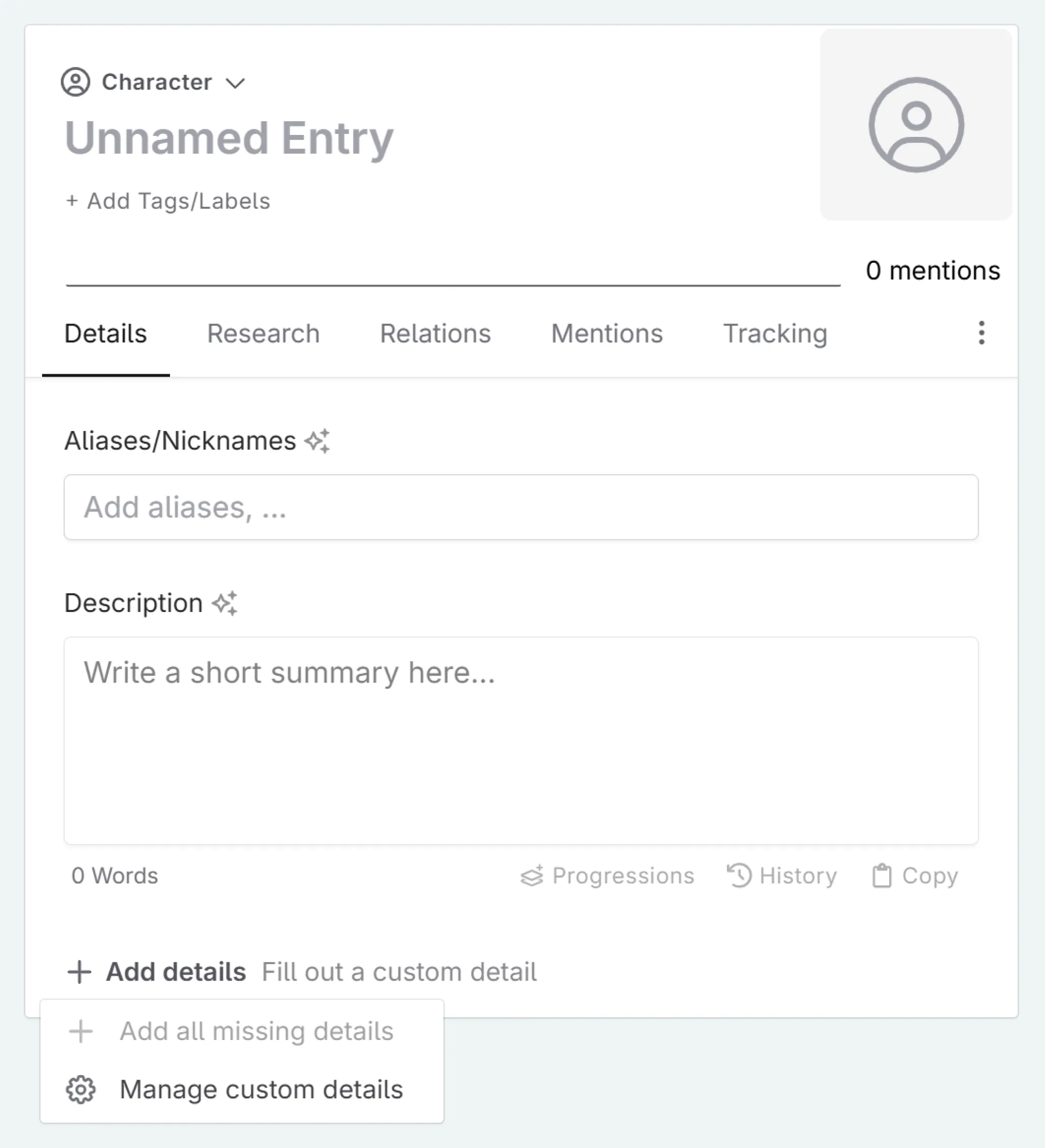
Scroll to the bottom and click add details > manage custom details
Select + new detail > text
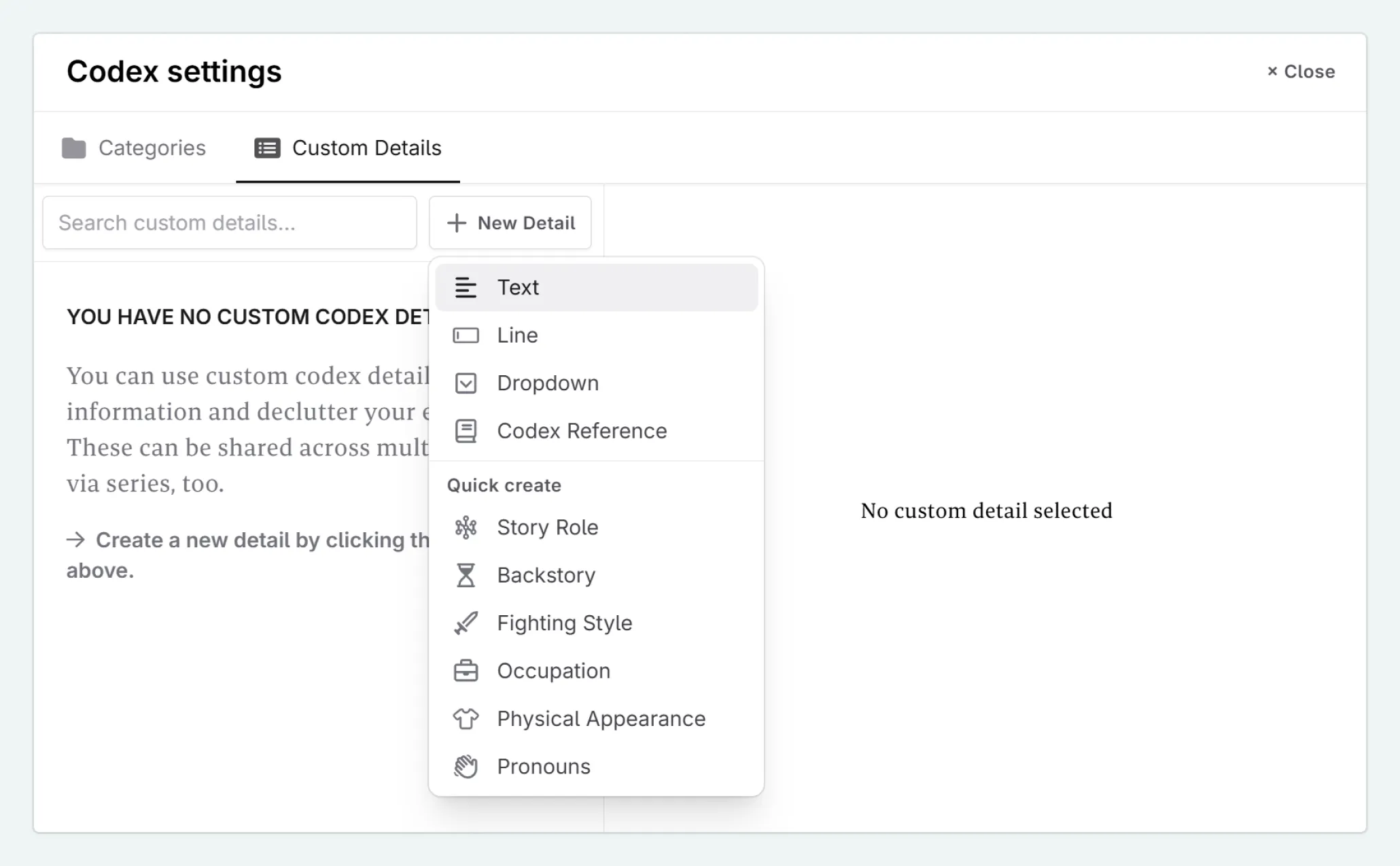
Name the entry “Voice Sheet”
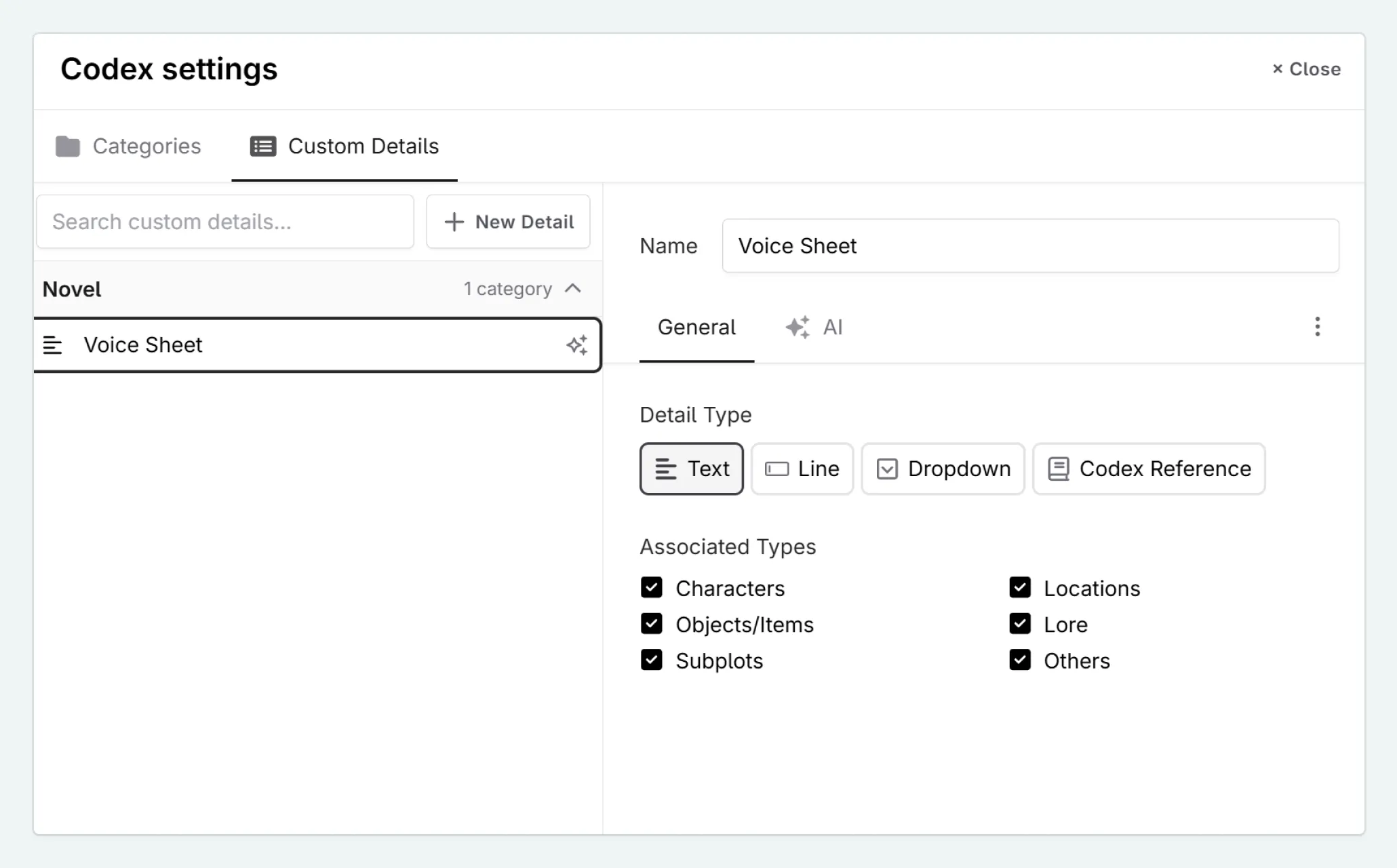
Now, back in your Codex entry, click + new detail > Voice Sheet
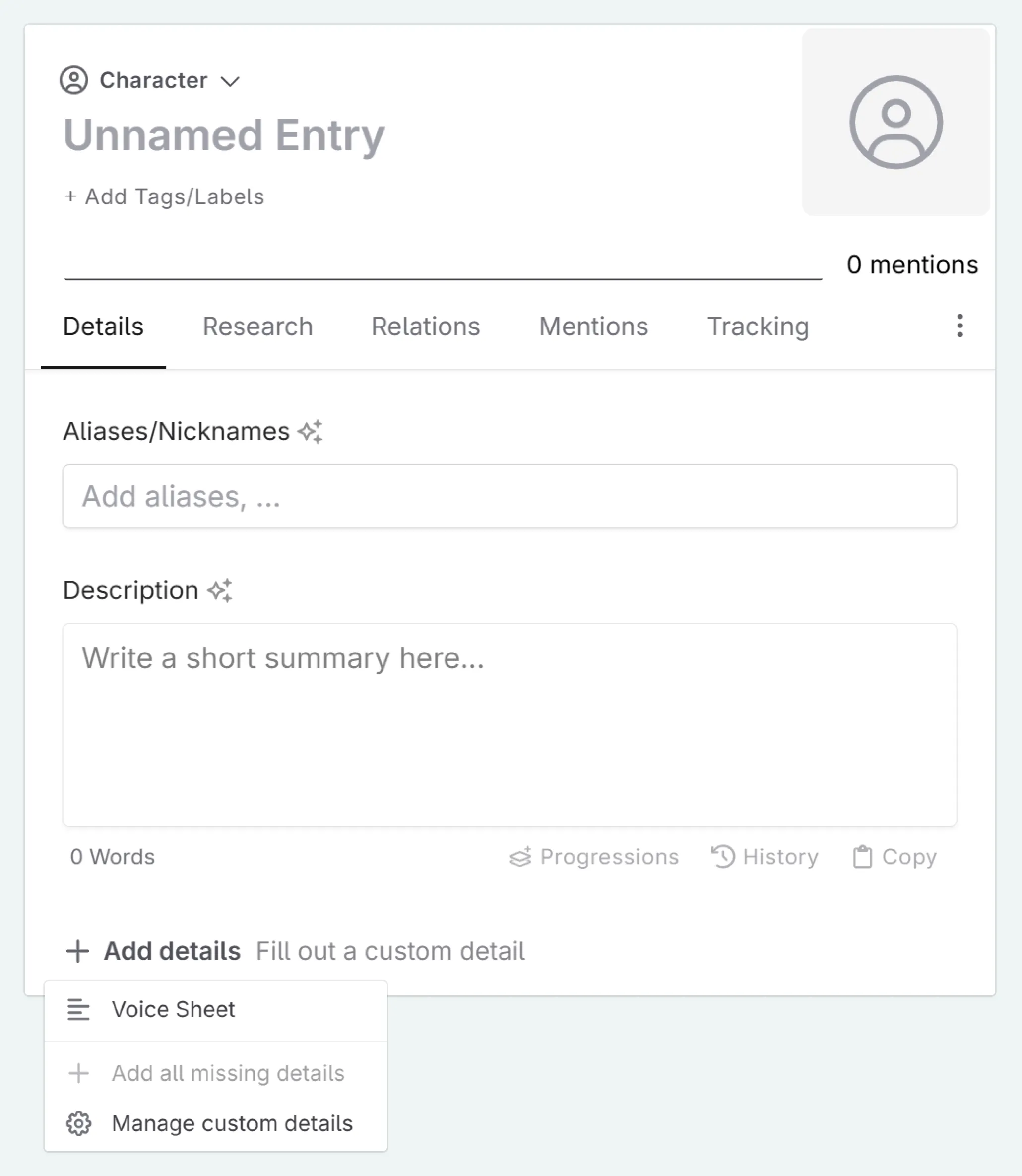
Add in examples of your character’s voice, which could be their default way of speaking, specifics when speaking to another character, or how their dialogue changes under certain emotions
Robert: “Yup.”
Robert: “Uh huh.”
Robert (to Eliza): “Sissy, you get under my nerves.”
Robert (angry): “Wait! What did you call me?!”
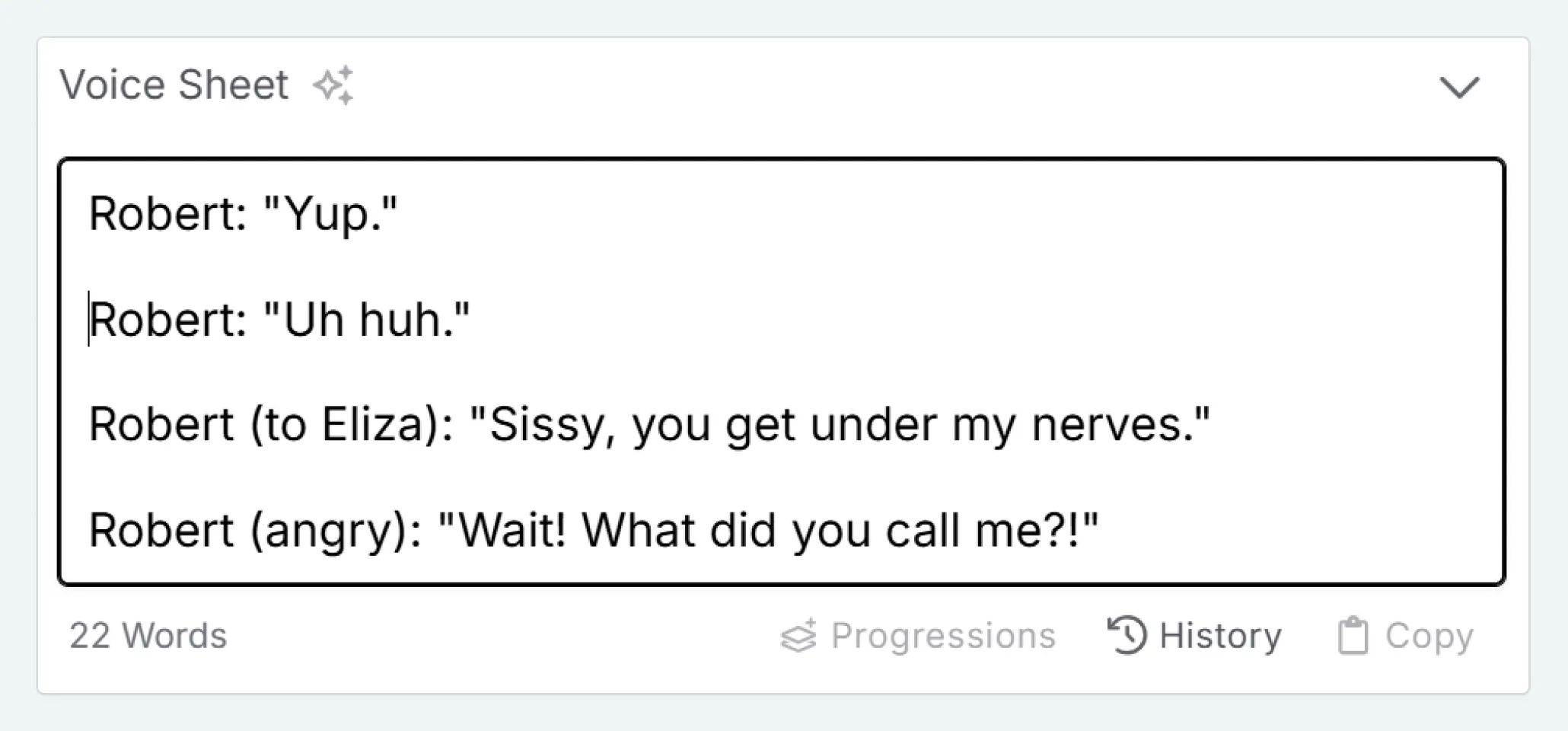
Case study
In the novel I have been working on during YouTube livestreams, Only Dogs Left, my protagonist Delilah has a very distinctive voice. She embraces her undercity heritage, refusing to ‘clean up’ her accent when speaking to higher ups, and curses like a sailor. But my story is also set thousands of years in the future. The words she uses won’t be the same as the ones we do now.
So I made her a voice sheet. Let’s take a look:
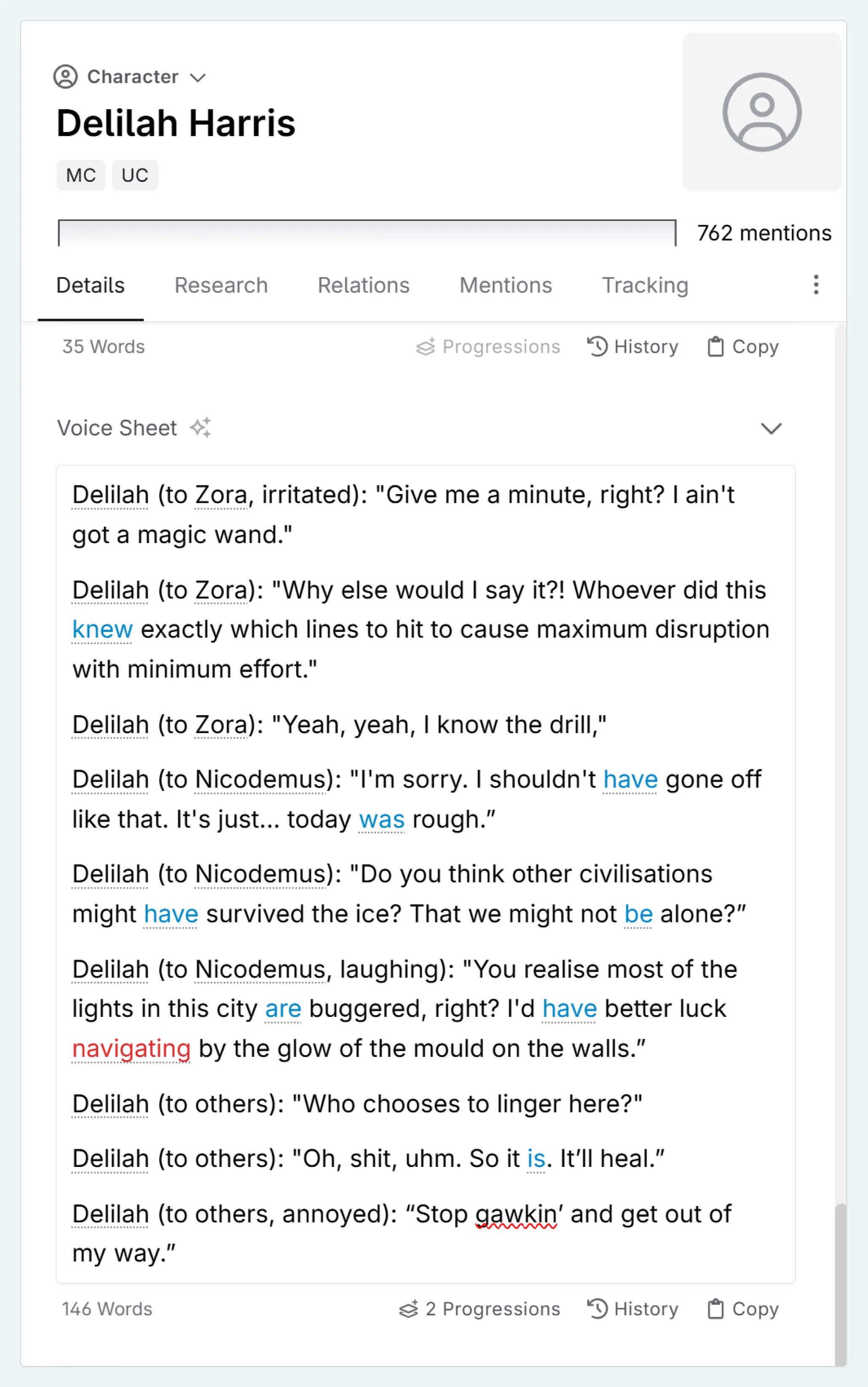
As you can see, these examples are about some pretty random things. Every day conversation moments. But they show her priorities, they show what words she drops in sentences. They show the swears she uses.
And for demonstration purposes, here is some prose written with the voice sheet, and some written without it (in no particular order). Can you guess which is which?
The scrap market’s stench hit Delilah’s nose before she rounded the corner - a nauseating mix of rust, oil, and desperation. Towers of salvage stretched towards the ceiling, their shadows dancing across the grimy floor panels. A part for her project had to be here somewhere.
She weaved through the narrow paths between stalls, scanning the piles of circuit boards and mechanical odds-and-ends. Her fingers traced along broken casings and twisted metal. Nothing matched what she needed - a Mark IV communications relay, preferably with its crystal matrix intact.
“Watch it!” A burly man knocked into her shoulder, sending her stumbling into a precarious stack of scrap.
“Oi! You’re the one who barged past.” Delilah steadied herself, rubbing her shoulder.
The man turned, his face twisted with contempt. “Keep your eyes forward then, girl. Market ain’t a place for daydreaming.”
“And it ain’t a place for shoving people about neither.” She squared her shoulders, though he towered over her. “Might find yourself knocking over something valuable next time.”
“That a threat?” He stepped closer, breath reeking of synthetic alcohol.
“Nah, mate. Just pointing out that karma’s got a funny way of working down here.” Delilah held his gaze, refusing to back down despite her racing heart.
“You’d best-”
The scrap markets buzzed with their usual chaos of haggling voices and clanking metal. Delilah weaved through the cramped stalls, her fingers brushing against rusted pipes and discarded circuit boards. The part she needed - a quantum frequency modulator - was rare enough that most traders wouldn’t recognise it if they had one.
‘That’s definitely not it.’ She picked up what the trader claimed was a modulator, but the connections were all wrong. The merchant’s hopeful expression fell as she set it back down. The air grew thick with the smell of burning plastic and ozone as she ventured deeper into the market’s maze. Her boots crunched over scattered washers and bolts that littered the ground between stalls. A trader’s voice cut through the din.
‘Oi! You there - looking for something specific?’
Delilah paused at a stall overflowing with communication equipment. The old woman behind the counter had knowing eyes that seemed to pierce right through her.
‘Maybe.’ Delilah kept her voice casual, examining a pile of salvaged nav screens. ‘Got any quantum frequency modulators?’
The woman’s weathered face creased. ‘Bit advanced for an apprentice mechanic, innit?’
Delilah’s hand instinctively touched the patch on her jacket marking her status. ‘Just for practice projects. Learning the theory.’
‘Course you are.’ The woman disappeared beneath her counter, emerging with a small component box. ‘This what you’re after?’
Inside lay exactly what Delilah needed - the distinctive crystal matrix barely scratched. Her heart leapt, but she kept her expression neutral. ‘Depends on the price.’
‘For you? Hundred credits.’
‘Hundred?’ Delilah’s fingers curled around the credits in her pocket. That was two weeks of spare parts money. ‘Seventy-five.’
‘Ninety, and I’ll throw in a set of calibration tools.’
Delilah hesitated. The tools would be useful, and she’d seen worse modulators going for twice as much. ‘Deal.’
The exchange was quick - credits for component. Delilah tucked her prize safely into her inner pocket, trying not to think about the meals she’d have to skip to make up the difference.
This lesson was taught by:
Kate Robinson
Based in the UK, Kate has been writing since she was young, driven by a burning need to get the vivid tales in her head down on paper… or the computer screen.